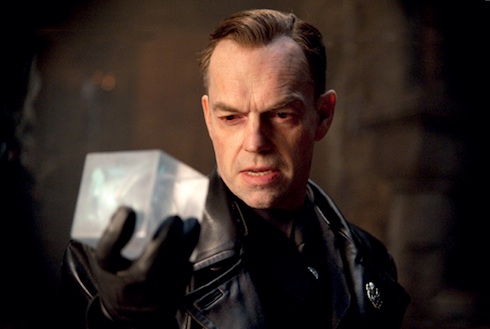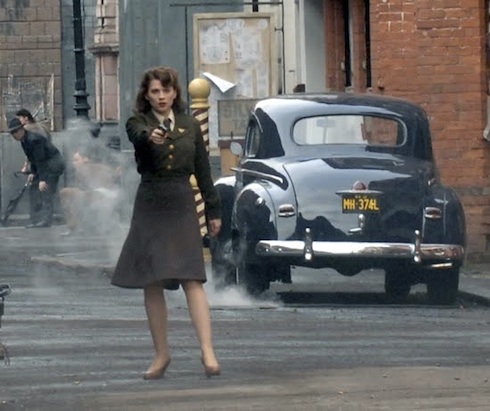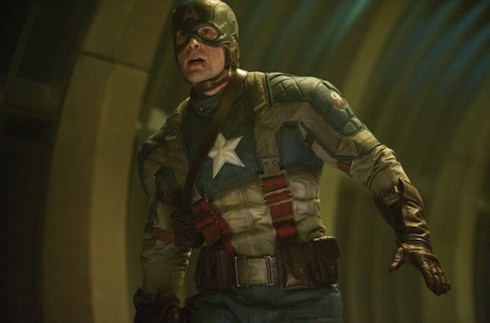Who saw a perfectly serviceable but largely unexceptional superhero movie this weekend? I did! Also you probably did, considering that Captain America: The First Avenger had the biggest opening weekend out of the bucketful of superhero movies we’ve gotten this summer.
Captain America as a cinematic venture is a surprisingly tough character to interpret. The character’s core personality is one of fierce patriotism codified by a boy-scout morality. (In much the same manner as Superman.) This is a superhero who is deeply respectful of those around him. That approach is refreshing, even inspiring, but also very boring in a dramatic sense. Must we thrill as Captain America does the right thing? Again?
Captain America doesn’t dare use its time to reflect on the policies and approaches of the nation that its main character symbolizes. This is a movie about purity of intent, as the character himself is, and the plot and settings reflect this.
Sounds boring, right? It sort of is. Luckily, the supporting cast keeps it afloat just enough to keep things fun.
Spoilers ahead.
Captain America: The First Avenger bookends itself with what is ostensibly a short prequel to next year’s The Avengers ensemble. In the prologue, Cap is found encased in ice in the Russian portion of the Arctic Circle, 70 years after his apparent demise, and the movie’s epilogue deals with his subsequent return to the waking world. Some expository blanks left from Iron Man 2, Thor, and a bit of The Incredible Hulk get filled in, tying these films together a little more tightly into their shared universe. The aforementioned films arguably deal with the consequences of the events of Captain America, which is fun to think about although not at all necessary to the enjoyment of this film.
The main sequence of the film, which takes place in the 1940s, wisely opens with Hugo Weaving as Johann Schmidt being deliciously, charismatically dastardly. Schmidt heads an organization called Hydra, a black science squadron formed to create technologies to aid in the Nazi war effort. (So like Nazis but worse, as I assume they were described in the pitch meeting for this years ago.) Schmidt himself was the first recipient of the Super Soldier serum that our boy Cap eventually gets, and will later peel off his face in an effort to prove that to us. For now, he’s raiding churches in Norway looking for an object of godly power.

Back in the U.S., the impossibly scrawny Steve Rogers attempts to join the army over and over again. He eventually comes to the attention of a German defector, Dr. Erskine, played by Stanley Tucci, who brings him before Agent Peggy Carter (Hayley Atwell) and Colonel Tommy Lee Jones, as played by Tommy Lee Jones.
Erskine is the creator of the Super Soldier serum and Steve is enrolled in its trainee program. He proves to be extraordinarily bad at simple tasks but is so determined to serve his country and do the right thing that he jumps on a grenade in an effort to save the entire supporting cast. Tommy Lee Jones really does not like Steve, but none of the other soldiers took the grenade bait, so Steve is our guy. Before the procedure, Erskine explains the key element to Steve’s character in one of the movie’s better scenes. Unlike Schmidt, Steve has never been gifted with enough power, enough presence, to give himself an easy life, and thus is properly respectful of that power once gained. (Erskine also denies him schnapps, which is almost as impactful as his speech to Steve.)
Steve undergoes the super soldier procedure shortly afterwards (under the watchful eye of Howard Stark, who hereafter becomes a main character) and, of course, a Hydra saboteur messes up the proceedings as soon as it looks like Dr. Erskine’s formula is working. Steve, now roughly eight feet tall, chases the saboteur, eventually catching him in a chase sequence that proves to be the only clear indicator in the entire film that he has abilities beyond normal men.
Here is where we stop and I craft an ode to the character of Agent Carter.
Carter is the only female character in the film, but the movie might as well be about her, as she proves herself more capable than Captain America on a number of occasions. As the Hydra saboteur escapes in a car, with Steve gamboling after like a spaz, she calmly steps out on the street, aims carefully, and nails the driver in one impressively distant shot. She then proceeds to sharpshoot the other supporting Hydra agents in the area and is the only character who successfully contains the damage done in the lab infiltration.

Carter has her own agenda and her own struggles (the fact that she is a woman of rank is not ignored), and most importantly, her own initiative. It is made clear that she refuses emotionally romantic relationships unless both parties consider the other an equal. She deflects sexual attention without compromising herself or losing the respect of her peers and she continues to save Cap’s life throughout the entire film. (The film is heavily banking on the two getting together, and the film’s last line is a rather touching commentary on the subversion of that trope.)
Carter is probably the most fully-formed female character I’ve seen in the recent spate of Marvel superhero films. (Gwyneth Paltrow in the Iron Man movies comes close.) and it’s obvious that what will eventually become S.H.I.E.L.D. is based on the exceptionalism of agents like her. Carter steals this movie completely out from under its main character and I wish there was a way to include her in the upcoming Avengers film.
Alongside the character of Agent Carter, Tommy Lee Jones and Hugo Weaving continue to be lively presences throughout the entire film. None of the other supporting cast, nor Cap himself, quite manage this, and this becomes laughingly apparent when one of those cast members dies.
The film also suffers from a dearth of action and some wild shifts in tone. A series of scenes with Cap in the U.S.O. are completely superfluous and the musical number that plays under them sounds like the cast of Annie gone mad. The movie uses these flaws to great effect in its epilogue. The tonal shifts, the blandness of its main character, and the measured affection of Agent Peggy Carter all play very well into the final scene, but they don’t make for an interesting movie.
Ultimately, Captain America: The First Avenger is for completists. It’s perfectly fine, perfectly fun, and Chris Evans is quite engaging as Captain America, but it borrows its best parts a little too heavily from other actors and other films to be able to stand on its own as well as Iron Man or Thor did.











So far, everything I’ve read about this movie follows the comic books I have stored in my basement. It’s fairly cannon which is so unusual in today’s screw with the story attitudes.
Yeah, it was a good mix of the original Captain America comics and the more recent Ultimates revision, along with some cheeky commentary on the old Captain America comics. I should give the movie more credit for making that balance seem effortless, actually.
I saw it this weekend, along with my non-science-fiction/fantasy reading sister. We both enjoyed it, although I agree with the ‘perfectly serviceable’ definition. My sister is now eagerly awaiting The Avengers.
I saw it yesterday with my comic-naive wife, who loved it. The movie gave the feel of a WWII epic rather than an overdone superhero flick; we especially liked the end credits with the 1940’s style public service ads.
It was refreshing to see a love of country and sense of sacrifice for the greater good portrayed in this positive fashion without making it into the bloat of cynicism and partisianship that frequently passes for love of country these days; while I am by no means a gung-ho jingoist, I had a very positive sense coming from this film and felt like it filled a gap that is missing in modern society.
Plus the agent was a mega-babe. Even the wife agreed…
Well, they could always re-cast Hayley as Sharon Carter, Agent Carter’s offspring, who in the comics has long been Cap’s modern-day love interest.
Personally, I loved the movie. It was a lot of fun, but when a certain person in muttonchops and bowler hat showed up, I was hooked (and then he was followed by the rest of the Howling Commandos, a lovely touch for classic comics geeks like myself). I’m thoroughly looking forward to the Avengers movie.
YOUR GUIDE TO MODERN FILM CRITICISM: A BINARY CHOICE
1. Movie has lots of action and excitement. “The character’s personal stories are lost in the cacophany of action scenes and derring-do.”
2. Movie has lots of dialogue and character development: “The film moves at a sluggish pace, caught up in its obsession with the minutiae of these character’s lives.”
GOOD JOB ON PICKING THE SECOND ONE, I ALWAYS LIKED THAT ONE
I thought it was fun, enjoyed it a lot, thought the movie followed the story well and the ending made selse and left you wanting more. I would recommend it, even if it could have used a few more laughs.
“[…] I wish there was a way to include her in the upcoming Avengers film.”
Well, the setting is comic book world.
“Carter steals this movie completely out from under its main character and I wish there was a way to include her in the upcoming Avengers film.”
Oh, and there is. In the comics, her niece is Cap’s love interest, and IIRC and agent of SHIELD. And since Nick Fury is in Avengers, why not Sharon Carter, who grew up with the stories of her aunt during WWII.